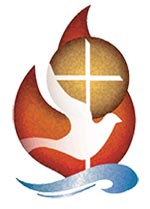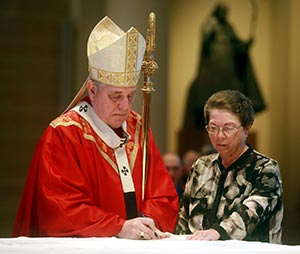Catholics in southeastern Wisconsin who ask, “What’s going to become of our church?” received a 23-page answer Sunday, Sept. 14, when Archbishop Jerome E. Listecki signed his Archdiocesan Synodal Decree – a response to and acceptance of recommendations made by the Archdiocesan Synod, June 6-8.
The archbishop signed the declaration on the altar during the 8 a.m. Mass at the Cathedral of St. John the Evangelist in Milwaukee. The entire document can be found at catholicherald.org
The declaration highlights each of the pastoral priorities that guided the synod. They are categorized by Archbishop Listecki’s pastoral priorities, i.e., liturgy and cultural diversity are under Catholic identity; evangelization, formation, Catholic Social Teaching, marriage and family are under evangelization; and stewardship, and leadership are under stewardship. Each notes the synod’s initiatives for what the church needs to address.
related stories |
For example, a synod initiative regarding liturgy is: “Direct our primary attention and strategic efforts to the weekend so that the music, message and ministries form a high-impact, integrated evangelizing message of Good News, especially to the lost and seekers.”
 Barbara Anne Cusack, chancellor of the Archdiocese of Milwaukee, witnesses Archbishop Jerome E. Listecki signing his Archdiocesan Synodal Declaration on the altar at the Cathedral of St. John Evangelist during the 8 a.m. Mass, Sunday, Sept. 14, the Feast of the Exaltation of the Holy Cross. (Catholic Herald photo by Allen Fredrickson)In his declaration, the archbishop responded, “We as an archdiocese will place a concentrated effort on inviting Catholics to return to Mass through creating hospitable and engaging parishes that integrate quality preaching, good music and well-trained liturgical ministries.”
Barbara Anne Cusack, chancellor of the Archdiocese of Milwaukee, witnesses Archbishop Jerome E. Listecki signing his Archdiocesan Synodal Declaration on the altar at the Cathedral of St. John Evangelist during the 8 a.m. Mass, Sunday, Sept. 14, the Feast of the Exaltation of the Holy Cross. (Catholic Herald photo by Allen Fredrickson)In his declaration, the archbishop responded, “We as an archdiocese will place a concentrated effort on inviting Catholics to return to Mass through creating hospitable and engaging parishes that integrate quality preaching, good music and well-trained liturgical ministries.”
Each of the pastoral priorities includes the top two initiatives surfaced by the synod and the archbishop’s response to how they will be implemented throughout the archdiocese.
In the declaration, the archbishop explains his vision for the archdiocese, reflected in its new mission statement:
“To proclaim the Gospel of Jesus Christ through his saving death and resurrection by calling, forming and sending disciples to go and make new disciples. As a people, we are called to encounter Jesus and grow as disciples through the sacramental life of the church.”
Everyone’s responsibility
In an interview with the Catholic Herald, Thursday, Sept. 11, Archbishop Listecki said he did not want implementation of the synod initiatives to “set tasks upon the parishes or cause them grief.”
“I want to focus on something that unites us all together, something that gives us a common vision. That was a great aspect of the synod,” he said.
Lest anyone thought implementation would be the sole responsibility of the pastor or the parish staff, the archbishop made it clear who he expects will execute the work of the synod.
“As we implement this, we have to find an appropriate way to involve everyone – and when I say everyone, I mean the person in the pew right through the parishes and institutions – to do a vision,” he said. “We want to get everyone involved in some way, in whatever way they can integrate it into the life of their parish or institution or their own personal life.”
‘Continue the excitement’
While the declaration details how the synod initiatives will be implemented, the archbishop noted that one aspect of the synod’s work stands out.
“If I have a priority, it is to continue the excitement about what we can accomplish,” he said. “What the synod did in its preparation is give us a heightened sense of our participation in the faith. I want to bottle that and make sure all of our parishes have that heightened need to participate in the faith.”
Archbishop Listecki does not want to set unrealistic levels for measuring success in the first year of implementing the work of the synod.
“You destroy what good is accomplished by setting your sights so high that they’re not achievable, but there is measurement in this,” he said. “If we are still able to maintain the excitement, if people collaborate, if our participation even grows 1, 2, 3 percent, that’s 1, 2, 3 percent of people who haven’t been participating in any way.”
One of the keys to putting the initiatives into practice at the parish level, according to the archbishop, is invitation.
“One of the great things that happened with the synod is that the invitation that went out brought forth individuals who might have been flying under the radar but who are now very much a part of and involved in visioning the church,” he said. “To bring those people out, to say there’s an opportunity for them to contribute, and to make those opportunities available, is going to be a wonderful aspect of the process, while keeping focused on what issues we want to concentrate on.”
Emphasis on lay formation
Citing the Second Vatican Council’s emphasis on “collaborative ministries,” Archbishop Listecki welcomed the synod’s initiative on formation of lay leaders.
“What we’re experiencing in the delegates and our observers is that the work of the church is accomplished in many ways. We took a look at the primary role of the ordained minister in the church, but you take a look at any given parish community and they would not be able to be the dynamic community you talk about without the ministries,” he said.
The initiative states: “Support, train and form qualified lay ecclesial ministers (paid church positions) in service to the church, with an emphasis on developing leadership roles, especially for women.”
The archbishop noted that people who occupy positions of ministry “have to do so with a sense of ministerial competence.”
“They also have to be part of education and training because they’re in a position where they’ve taken whatever expertise they have and are sharing it with others, or they’re inviting others to be part of this church and community in a significant way,” he said.
Future beneficiaries
Archbishop Listecki expressed hope that just as today’s Catholics benefited from the work of those who established and built up the church in southeastern Wisconsin, future generations would benefit from what will be done over the next 10-15 years as a result of the synod.
“It is my hope that with what we’re passing on to the next generation, the next generation will look back and say, ‘I am so proud that I am a member of a faith whose participants stood up, identified themselves as belonging to this faith, committed themselves to build a community that’s vibrant, that’s charitable, and that looks to God as the source of all of our blessings.’”
